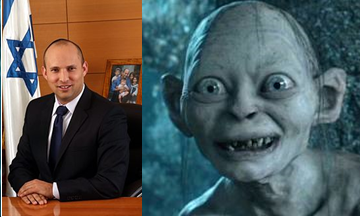“We’re done apologizing; we love Israel; we’re joining Jewish Home!”
So goes the smart-alecky, unavoidable, possibly un-Jewish, and certainly controversial video released by Naftali Bennett’s Jewish Home (HaBeit HaYehudi) party in preparation for the upcoming Israeli elections. The party – and Bennett, of course – advocates a right-wing, ultra-nationalist agenda: annexing 60% of the West Bank and expanding the settlements, a dogmatic view of a militaristic Jewish identity, most certainly not negotiating with Palestinians over “the homeland” or accommodating the desires of either “hipsters” in Tel Aviv or Haredim who “don’t serve their country” by doing time in the Israeli Army. Of course, above all of this stands “a love for Israel” – joined with a refusal to “apologize” (for the Occupation, for settlements on Palestinian land, for nationalist slogans, for jumping the queue), alongside a very fixed idea of what “Israel,” “Judaism,” and “Zionism” is. Israel, especially – it is immutable, it is unchangeable, it is total. Bennett says so himself.
Oddly enough, the first time I heard that, I did not think of a simple comparison at all. Rather – perhaps influenced by my chosen city of Oxford – my mind wandered over to the Lord of the Rings, J.R.R. Tolkien’s fantastic fantasy creation that is a masterpiece of English literature – and of course, famously adapted to film. Specifically, I thought of Gollum. In the series, Gollum acquires the magical, dangerous One Ring (for which he strangles his cousin) – which, though granting him unusually long life – deforms him, drives him to madness, and obsesses him. He comes to call the Ring his “precious,” his “love,” and will go to all ends to regain it after he loses possession. It is the idol that rules his life. Fine, then, but what does a fantasy novel character with giant eyes have to do with the Israeli right’s wonder-boy politician?
Everything. a way, Naftali Bennett is Gollum. Allow me to explain – you might be confused, since Bennett is clearly not running around the country saying “my precious.” (Or is he?)
Let us start with Gollum’s obsession with the “precious” – the Ring – for Naftali Bennett is similarly obsessed with his “precious” – the strength of a romanticized Israel. Gollum loves his Ring. He wants it, he cherishes it, he has killed for it, he madly pursues it, and G-d help you if you tell him it is not needed. (Though Tolkien does note that he “loves and hates” the Ring for its power.) For Gollum, the Ring is everything. Similarly for Naftali Bennett’s vision of Israel. Let it be known that he does not believe Israel should or can relinquish any precious land; let it be known that the settlements are, in Bennett’s mind, part of Israel’s precious destiny; let it be known that strength and a non-apologetic Israel come above any sort of relinquishment of Israel’s precious status. Yes, some of it is reflective of a sector of the Israeli public that increasingly sees Israel in such terms: precious and beloved, of absolute importance and absolute immutability. Like the Ring. But Bennett goes to an almost unique length in order to promulgate this vision of the absolute Israel – which he sees as precious beyond compare, and certainly more so than a “weak and apologizing” or “incomplete” Israel.
Of course, Gollum stops at nothing in his pursuit of the Ring – and to an extent, it seems that Bennett does not stop either. Now, Bennett of course does not strangle Deagol, or anyone else (we think). However, Bennett goes to rhetorical extremes and at the least uses rather insulting language against anyone who challenges – directly or by being a lumbersexual – him, from calling them “freyers” (“suckers”) to mocking, asinine ads. But on a deeper level, Bennett is content to smash anything that might go against his vision of a strong Israel Guarantees for the rights of Israel’s Arab citizens, already in peril in many circumstances? Gone! “We must defend the Jewish nation-state.” Preserving democracy in a state that no longer can legitimately claim a monopoly on democracy in the region, in which freedom of speech is steadily slipping away? Look at how he and his party underlings have openly advocated for anti-democratic measures. Is this vision so important that all must fall before it? Like the dangerous, demonic Ring, I would contend certainly not. So why is it pursued?
Just as Gollum cannot bear to give his Ring away, nor can Bennett bear to part with nationalism or the settlements. Hearing Bennett speak of Israel, and of the settlements – in which he himself does not live – and how they will stay, one can feel that he is almost talking about something mythical. An idol, even – something holy (to him). It almost uncannily comes to feel like he is talking about an object of magical power – Israel – that is so important that it must be possessed in that way. Like Gollum.
In short, Israel becomes his “precious.” The settlements are also his “precious.”
Of course Naftali Bennett is not Gollum, and far more reasonable (and intelligent) than Gollum. (He certainly has better teeth.) But Naftali Bennett is Gollum. He runs around Middle Earth, I mean, the Middle East trying to protect his “precious” – be it nationalism, the settlements, or pride in “Israel.” As for the Bilbo Baggins he is trying to keep the Ring from – be they Arabs, the Ultra-Orthodox, or hipsters – well, Bennett can fly into rages over them that, if not as theatrical as Gollum’s pursuit, certainly have far more real-world influence. Of course, the danger of the power of the Ring – the vision of Israel – is never questioned.
A bonus for our Hebrew-speaking readers:
Jonathan Paul Katz is a graduate student at the University of Oxford. He apologizes for the Lord of the Rings spoilers.


